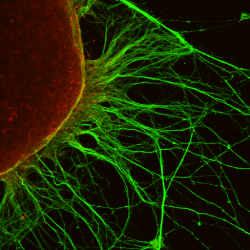 Neuronal cell biology falls under the larger umbrella of cellular biology, the realm of science that pokes, prods, and illuminates the most basic unit of life. Compared to other cell types, however, the neuron’s inner workings are not as well understood. The mystery stems in part from the very nature of nerve cells: they’re large and highly polarized, meaning one end – the tree-like dendrites – looks and functions very differently than the other end – a long, cord-like projection called an axon. In addition, the electrical environment inside the cell is vastly different from the outside, a contrast that facilitates the propagation of electrical signals along the axon. And while the cells’ unique morphology can prove challenging for experimentalists in the lab, the same qualities facilitate graceful cell-to-cell communication in the brain.
Neuronal cell biology falls under the larger umbrella of cellular biology, the realm of science that pokes, prods, and illuminates the most basic unit of life. Compared to other cell types, however, the neuron’s inner workings are not as well understood. The mystery stems in part from the very nature of nerve cells: they’re large and highly polarized, meaning one end – the tree-like dendrites – looks and functions very differently than the other end – a long, cord-like projection called an axon. In addition, the electrical environment inside the cell is vastly different from the outside, a contrast that facilitates the propagation of electrical signals along the axon. And while the cells’ unique morphology can prove challenging for experimentalists in the lab, the same qualities facilitate graceful cell-to-cell communication in the brain.
Neurons are responsible for sending and receiving a wide range of information involved in everything from sensing a hot stove to learning a new language. To do this, they transmit signals within networks called circuits. In a circuit, the long, slender neurons (akin to wires with frayed ends) connect with neighboring cells, communicating with each other across synapses – narrow spaces that serve as bridges between the cells. The signals are propagated by electrical currents created by chemicals called neurotransmitters. These synapse-driven circuits elicit all behavior, and neurobiologists are fascinated by the dense tangle of cells that create the neural webs. And though neurobiology and neuronal cell biology share common features, the disciplines are complementary, not equivalent.
Neuronal cell biology is a deep-dive into the individual unit of the circuit, the neuron. By expanding on concepts and techniques employed in cell biology, neuronal cell biologists aim to tease out the subcellular nuances that power synaptic, cell-to-cell communication. How do proteins floating in the cell communicate with each other, and how does that change during a synaptic exchange? What are the mechanisms that change synaptic function as a result of learning? Where are particular proteins distributed throughout the neuron, and why? By peering into neurons with cutting-edge microscopes, neuronal cell biologists hope to tackle questions like these and pave a cellular foundation for the circuits that drive our every thought and action.
Read the News Release:
New Research Area Comes to Janelia: Neuronal Cell Biology
Janelia's campus was designed to inspire a vibrant scientific community.
- Gerry Rubin, Executive Director, Janelia Research Campus

